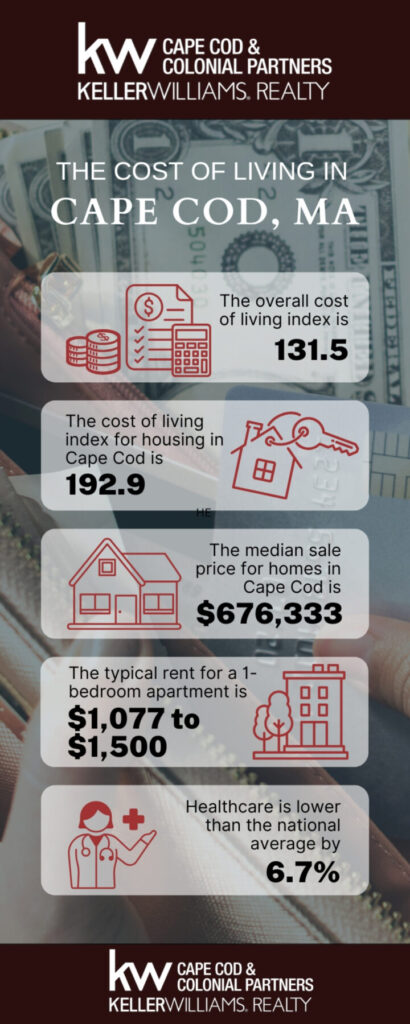Known for its charming coastal towns, beautiful beaches, and laid-back lifestyle, Cape Cod offers a unique quality of life with excellent health care, quality education, and a strong business community.
However, the peninsula’s appeal as a desirable place to live comes with a high cost of living. Cape Cod cost of living requires careful consideration for anyone who is planning to move to this location.

Introduction to Cape Cod's Cost of Living
Is Cape Cod expensive to live? The cost of living in Cape Cod is relatively high, with a cost-of-living index score of 131.5, while the state average is 127.5.
A cost-of-living index is particularly helpful if you are considering moving to Cape Cod and you want to see if living in this location would be beneficial for you given your projected income.
This index is based on a national average of 100. So, for example, if the COL index of housing in Cape Cod is 192.9, then it is 92.9% higher than the national average.
Below is a table showing the cost of living in Barnstable County, where Cape Cod is located, to give you an idea how expensive or affordable this location is relative to the rest of the state and the country.
| Cost of Living | Barnstable | Massachusetts | United States |
|---|---|---|---|
| Overall | 131.5 | 127.5 | 100 |
| Grocery | 110.3 | 108.9 | 100 |
| Health | 93.3 | 90.2 | 100 |
| Housing | 192.9 | 175.0 | 100 |
| Utilities | 115.9 | 112.9 | 100 |
| Transportation | 97.0 | 107.9 | 100 |
| Miscellaneous | 140.6 | 147.9 | 100 |
One of the factors affecting the cost of living in Cape Cod is the popularity of the neighborhoods in the area as vacation destinations.
The limited land availability for development in Cape Cod also drives up the prices of basic expenses, such as groceries, utilities, and healthcare.

Housing Expenses
Housing is the biggest expense in Cape Cod. As of November 2024, the average home value in Barnstable County is $732,660, reflecting a 3.9% increase over the past year.
The median sale price is $676,333, with a median list price of $799,333. In this competitive real estate market, homes in Cape Cod are selling rapidly, averaging just 22 days on the market.
Renting an apartment might be a practical option for those seeking flexibility. The price range of a 1-bedroom apartment in Cape Cod is between $1,077 and $1,500, with an average size of 624 square feet.
For those who need more space, the price range of a 2-bedroom apartment is between $1,288 and $2,069, with an average size of 823 square feet.
Healthcare Costs
Residents in Cape Cod benefit from high-quality healthcare, having access to excellent medical facilities and a robust network of healthcare providers. With a cost index of 93.3, healthcare in the peninsula is 6.7% below the national average.
| Healthcare | Average Cost |
|---|---|
| Doctor’s visit | $120 |
| Dental cleaning | $100 |
| Fitness club membership | $45 |
Utility Costs
Utilities contribute significantly to the overall cost of living in Cape Cod, MA, with an index score of 115.9, about 16% higher than the national average.
The average monthly utility bill for a modest 915-square-foot apartment is $171.66, approximately 11% higher than in other U.S. regions.
| Utilities | Average Cost |
|---|---|
| Electricity | $355 |
| Gas | $3 |
| Cable and Internet | $100 |
| Phone | $184.49 |
| Water | $34 |

Food and Grocery Prices
The cost of food and groceries in Cape Cod reflect the upscale living standards in the area. Given the higher prices, budgeting for food is essential.
| Item | Average Cost |
|---|---|
| Dinner at a Mid-Range Restaurant | $75 |
| Meal at a Fast-Food Restaurant | $10 |
| Eggs (one dozen) | $4.25 |
| Fruits and Vegetables | $4 |
| Meat and Seafood | $9 |
Education Expenses
The cost of education in Cape Cod varies, depending on the institution and the program.
At Cape Cod Community College, tuition and fees for a full-time student amount to $7,500 per year. Massachusetts residents who qualify for Free College may enroll at this college for free.
The tuition at Cape Cod Academy is based on a sliding scale, with the maximum level set annually by the Board of Trustees. Below are the tuition levels for each grade:
- Kindergarten: $24,100
- Lower School: $31,600
- Middle School: $34,600
- Upper School: $36,600
The Cape Cod Institute offers a variety of discounts to students. For instance, those taking more than one course are given a $100 discount on their second course. Full-time graduate students, doctoral students, and resident physicians are also offered reduced tuition.
At the Academy for Lifelong Learning of Cape Cod, membership fee is $125 per student for each semester. This fee covers membership, all courses, and educational and social activities.

Transportation Expenses
Transportation costs in Cape Cod, MA, are more affordable compared to other living expenses with an index score of 97, 3 points below the national average.
| Transportation in Cape Cod | Average Cost |
|---|---|
| One Way Ticket | $2 |
| Taxi Ride | $4 |
| Gasoline (1 Gallon) | $2.89 |
Most Cape Cod residents use their personal vehicles to get around the peninsula. Daily commute is relatively convenient, with an average travel time of 26.7 minutes.
Cost of Living Comparison with Other Regions
When considering the cost of living in Cape Cod, it is helpful to compare it to other popular nearby destinations, such as Martha’s Vineyard and Nantucket.
The median home price in Martha’s Vineyard is $1.5 million, relatively higher than Cape Cod’s median of $676,333. Rent is also higher, with vacation rentals often exceeding $4,500 per month.
The cost of living in Nantucket is higher than that in Cape Cod, 58% above the national average. The average home value in Nantucket is $2.8 million, far surpassing that of Cape Cod. Utility and grocery costs are also much higher, making Nantucket significantly more expensive overall.
Compared to both comparable regions, it is more affordable to live in Cape Cod, MA.

Affordable Areas Within Cape Cod
If you’re looking for affordable housing in Cape Cod, consider towns like Barnstable, Yarmouth, Dennis, Sandwich, Bourne, Mashpee, and Harwich.
These areas generally offer more budget-friendly housing options compared to other parts of the Cape. They also provide a diverse range of single-family homes, condos, and apartments.
Additionally, these towns are ideally located in the central and mid-Cape region, providing convenient access to various Cape Cod attractions.
Conclusion
If you’re considering making Cape Cod your home, it’s important to factor in the cost of living in this location.
Do you have any questions or concerns about Cape Cod’s cost of living? Feel free to give me a call at 508-846-2243 or email me at erin@homesofcapecod.com to schedule an appointment.
Frequently Asked Questions
Is Cape Cod an expensive place to live?
The cost of living in Cape Cod is relatively high, with a cost-of-living index score of 131.5, which means that its cost of living is 31.5% higher than the national average.
What are the average housing costs in Cape Cod?
The average home value in Barnstable County is $732,660.
How do utility costs in Cape Cod compare to the national average?
Utilities expenses in Cape Cod are 16% higher than the national average.
Are there affordable areas to live in Cape Cod?
Yes. If you’re looking for affordable housing in Cape Cod, consider towns like Barnstable, Yarmouth, Dennis, Sandwich, Bourne, Mashpee, and Harwich.





